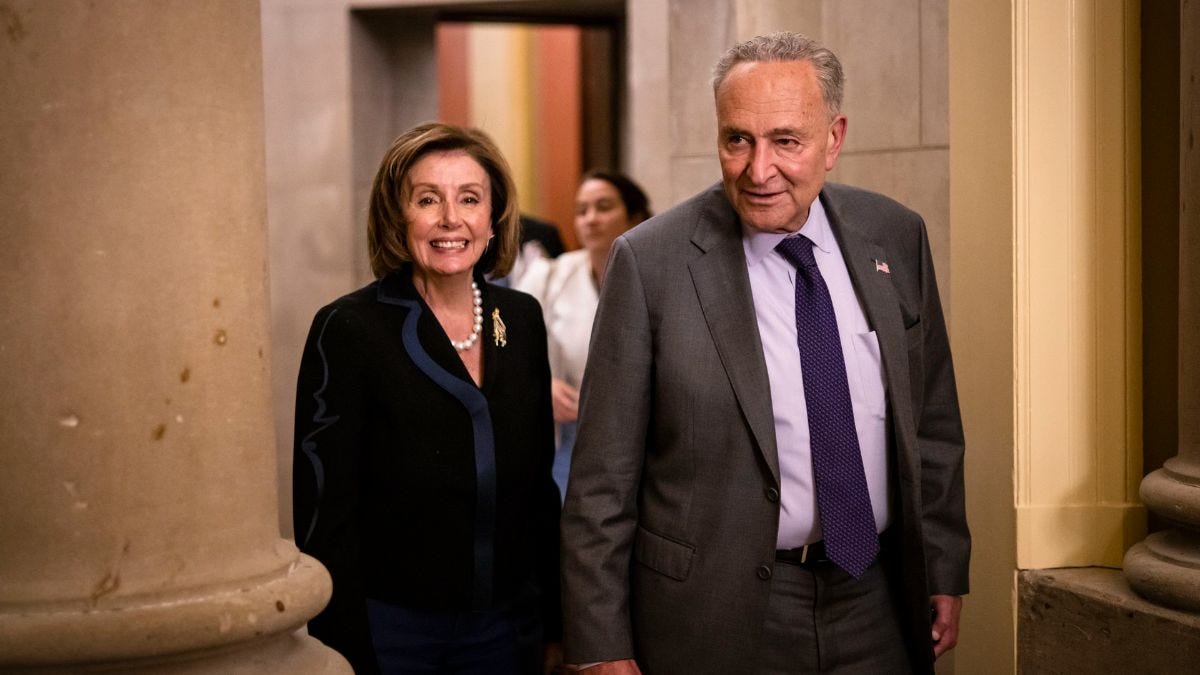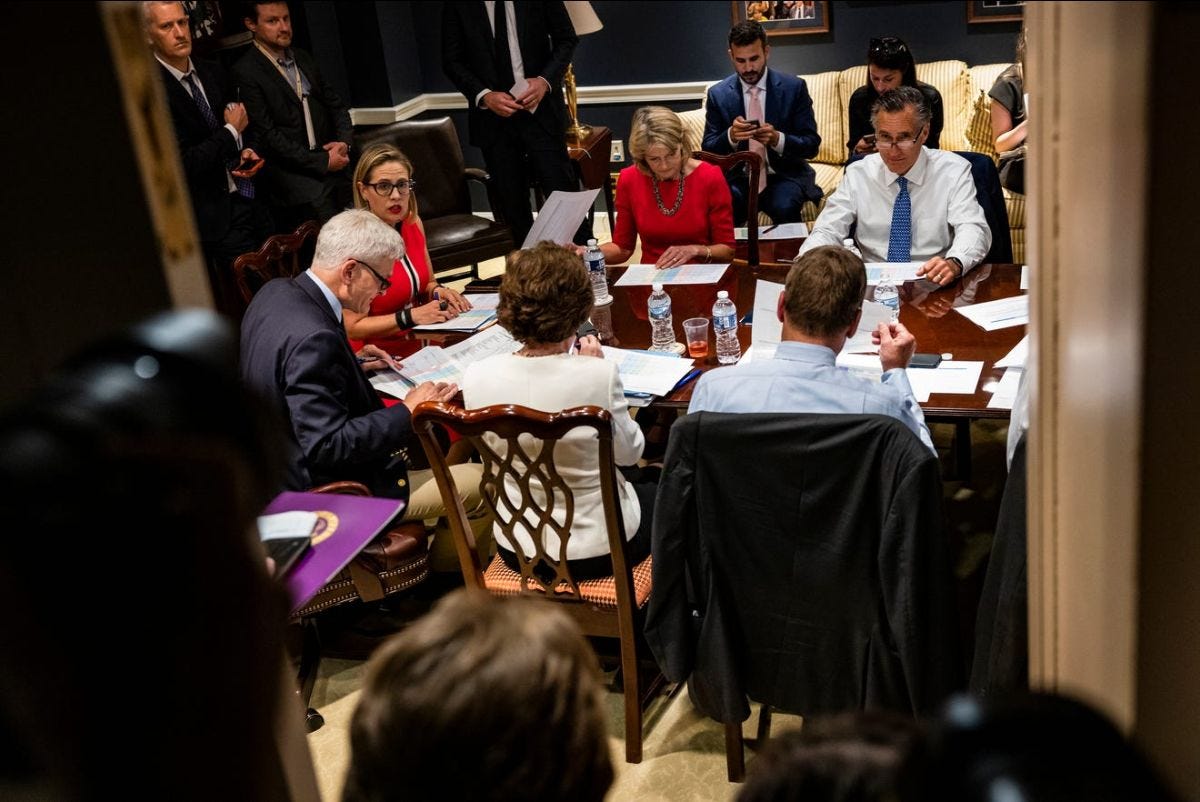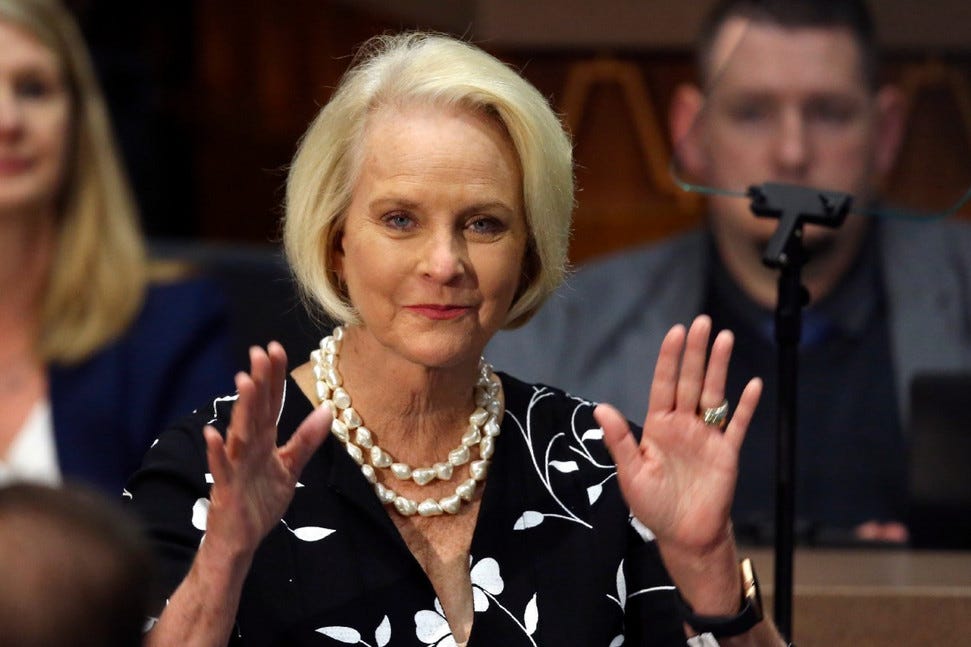Wake Up To Politics - June 24, 2021
Wake Up To Politics: Senators reach infrastructure framework
Good morning! It’s Thursday, June 24, 2021. Election Day 2022 is 502 days away. Election Day 2024 is 1,230 days away.
ICYMI: Wednesday’s newsletter was packed with behind-the-scenes insights from the defeat of the Democratic voting rights package, including my brief Q&A with Vice President Kamala Harris and an inside account of what it was like in the Senate chamber as the bill was blocked. Read it here if you missed it yesterday.
White House officials and a bipartisan group of senators agreed on a tentative framework for an infrastructure deal on Wednesday. The “breakthrough,” as Sen. Susan Collins (R-ME) put it, came after weeks of almost non-stop negotiations, during which President Joe Biden frustrated even members of his own party with his desire to strike an elusive bipartisan agreement.
A group of the Senate negotiators will head to the White House today to brief Biden on their proposal in person.
According to Axios, the framework calls for $1.2 trillion in spending over eight years — $559 billion of which is new spending, while the rest repurposes funds that have already been appropriated by Congress.
The package will be fully paid for, although the negotiations have yet to reveal which funding mechanisms they plan to use. How the package would be paid for was one of the final sticking points in the bipartisan talks; repurposing unused Covid relief funds and beefing up IRS tax enforcement are among the top ideas that were discussed.

With the outline of a deal in hand, the question now becomes: Can it pass both chambers of Congress? In the Senate, the agreement has 21 votes — 11 Republicans and 10 Democrats — locked down.
In order to get to 60 (the threshold required to overcome a filibuster), the plan will likely need to get the support of both Senate Majority Leader Chuck Schumer (D-NY) and Senate Minority Leader Mitch McConnell (R-KY). Neither has been directly involved in the negotiations, or formally endorsed the proposal, although Schumer offered praise for “the concepts that we have heard about” on Wednesday.
On the Democratic side, the biggest hurdle will be garnering progressive support, as Sen. Bernie Sanders (I-VT) and others are conditioning their support of a bipartisan deal on receiving a commitment from their moderate Democratic colleagues that it will be followed by a more expansive reconciliation package.
While the bipartisan agreement only covers “hard infrastructure” projects, such as roads and bridges, the reconciliation plan (which would only need 51 votes in the Senate) would include some of the proposals that Democrats have referred to as “human infrastructure.”
According to a draft obtained by Business Insider, Sanders is circulating a $6 trillion proposal that would include a raft of varied progressive priorities, from creating a pathway to citizenship for undocumented immigrants to lowering the Medicare eligibility age to 60.
Progressives have yet to receive their commitment from the likes of Sens. Joe Manchin (D-WV) or Kyrsten Sinema (D-AZ) that they would back a reconciliation package, which could complicate the bipartisan deal’s path in both chambers. While there would likely be enough Republican support in the Senate to overcome any progressive defections, it is uncertain how much GOP support the plan will garner in the House, where Democrats have only four votes to spare.

Lawmakers are also facing another significant complication: they only have so much time. Schumer and House Speaker Nancy Pelosi (D-CA) told reporters that they want both the bipartisan deal and the one-party reconciliation bill to receive votes in both chambers in July.
But it can take weeks to put together a bill under the budget reconciliation process, and Democrats have yet to agree on a suitable package. (Some progressives are pushing to go as high as $10 trillion, while the current $6 trillion is likely to be too large for many moderate members.)
Both chambers of Congress are leaving town after today for their July 4th recess, which will gobble up two weeks of time even as significant question marks continue to hover over the two packages and their likelihood of passage.
The Rundown
What else you need to know to start your day.
ELECTIONS: “California Democratic Gov. Gavin Newsom will face a recall election, marking just the second time in state history that a special election will be held to recall a sitting governor. State officials confirmed Wednesday that a recall election will proceed after just 43 people withdrew their signatures from petitions to recall the governor during a 30-day window required by state law.” (CNN)
→ “India Walton scored an apparent victory Tuesday over four-term incumbent Byron Brown in a Democratic primary for Buffalo mayor, making her poised to become the first female and first socialist to lead New York's second-largest city... Assuming Walton is elected, Buffalo would become the largest American city to have a socialist mayor since Milwaukee in 1960.” (USA Today)
BIDEN ADMINISTRATION: “President Joe Biden named four ambassador nominees on Wednesday, including Cindy McCain, the wife of the late Republican Sen. John McCain, as U.S. representative to the United Nations Agencies for Food and Agriculture.” (Politico)
→ “The Biden administration has forced out the head of the U.S. Border Patrol, Rodney Scott, clearing a path for a leadership overhaul at an agency strained by a 20-year high in illegal border crossings, and whose top officials were broadly sympathetic to President Donald Trump.” (Washington Post)
SUPREME COURT: “In the case of the cursing cheerleader, the Supreme Court notched a victory for the free speech rights of students Wednesday, siding with a high school student whose vulgar social media post got her kicked off the junior varsity squad.” (Associated Press)
CAPITOL RIOT: “The first person to be sentenced in connection with the riot at the Capitol — a 49-year-old woman from Indiana — will serve no time in prison after reaching an agreement with the government and pleading guilty on Wednesday to a misdemeanor disorderly conduct charge.” (New York Times)
Daybook
What’s happening in Washington today. (All times Eastern.)
Executive Branch
→ President Joe Biden will receive his daily intelligence briefing at 10:15 a.m. Later in the day, he will travel to Raleigh, North Carolina, for a visit focused on encouraging vaccinations. At 4:50 p.m., he will visit a mobile vaccination unit and meet with frontline workers and volunteers. At 5:15 p.m., he will deliver remarks on the importance of getting vaccinated. Biden will then return to Washington, D.C.
→ Vice President Kamala Harris will meet virtually at 4:15 p.m. with members of organizations partnering with the administration to help people in their communities get vaccinated.
→ First Lady Jill Biden will travel to Florida to encourage vaccinations. At 2 p.m., she will visit a drive-through vaccination site in Kissimmee. At 4:45 p.m., she will join the Tampa Bay Lightning for a vaccination event.
→ White House Principal Deputy Press Secretary Karine Jean-Pierre will hold a press gaggle during the Air Force One trip to Raleigh.
Legislative Branch
→ The Senate will convene at 10 a.m. and proceed to consideration of S.1251, the Growing Climate Solutions Act. At about 11 a.m., the chamber will vote on a substitute amendment to the bill by Sen. Mike Lee (R-UT), followed by a final vote on the measure. The Senate will then resume consideration of the nomination of Candace Jackson-Akiwumi to be a U.S. Circuit Judge for the 7th Circuit, holding a final confirmation vote at around 1:45 p.m.
→ The House will convene at 10 a.m. The chamber is scheduled to vote on four pieces of legislation:
H.R. 239, the Equal Access to Contraception for Veterans Act
H.R. 1443, the LGBTQ Business Equal Credit Enforcement and Investment Act
S.J.Res. 15, providing for congressional disapproval under chapter 8 of title 5, United States Code, of the rule submitted by the Office of the Comptroller of Currency relating to “National Banks and Federal Savings Associations as Lenders”
S.J.Res. 13, providing for congressional disapproval under chapter 8 of title 5, United States Code, of the rule submitted by the Equal Employment Opportunity Commission relating to “Update of Commission's Conciliation Procedures”→ The House Administration Subcommittee on Elections will hold a hearing at 10 a.m. on “the right to vote, methods of election, jurisdictional boundaries, and redistricting.” Former Attorney General Eric Holder will be among the witnesses.
→ The House Education and Labor Committee will hold a hearing at 10:15 a.m. on the “policies and priorities” of the Education Department, featuring testimony from Education Secretary Miguel Cardona.
→ The House Select Committee on the Modernization of Congress will hold a hearing at 11 a.m. on “rethinking congressional culture,” featuring testimony from experts in organizational psychology, cultural change, and conflict resolution.
Judicial Branch
→ The Supreme Court will meet for its weekly conference.
2024 Central
→ Former Vice President Mike Pence will deliver remarks at the Ronald Reagan Presidential Library in Simi Valley, California, as part of the “Time for Choosing Speaker Series.” Several other potential 2024 Republican presidential candidates are slated to participate in the series over the coming weeks and months.
→ Former UN Ambassador Nikki Haley will deliver the keynote address at an annual dinner hosted by the Iowa Republican Party in Des Moines, Iowa, and will campaign for Republican candidates in the first-in-the-nation presidential caucus state.
Thanks for waking up to politics! If you enjoy reading this newsletter, I’d be so grateful if you’d consider donating to help support me and my work. If you want to show off your support for Wake Up To Politics, you can also buy some merchandise.
Also: don’t forget to tell your friends and family to sign up for the newsletter using your unique referral link. And if you have any questions or comments, feel free to email me at any time.




